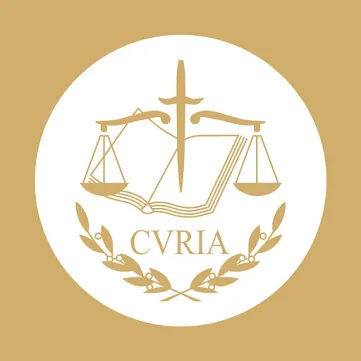Court of Justice
Tuesday 4th September (2.30 pm)
Judgment in Case C-80/17 Juliana
Responsibility for damage caused by a motor vehicle withdrawn by its owner from use
There will be a press release for this judgment
A Portuguese woman, for medical reasons, did not intend to use anymore her car, which she parked in her yard where she did not move it from again. As she stopped using the car, she did not take out insurance against civil responsibility for this vehicle. However, she did not officially withdraw it either from road-traffic.
In November 2006, the woman’s son removed the keys to the car from a drawer in her mother’s room, without her authorisation or knowledge, moved the car from her yard and drove it away. Subsequently, the vehicle was involved in a road-traffic accident, in which the man and two of his passengers were killed. As the car was not insured against civil responsibility, it was incumbent on the Portuguese fund entrusted with making good for damage caused by non-insured vehicles to pay damages in respect of the passengers. The fund then requested the car’s owner to reimburse it a part of the damages it had paid for the passengers.
The Portuguese court hearing the dispute between the car’s owner and the fund has asked the Court of Justice (the insuring of motor vehicles against civil responsibility is a matter of EU law) if, in the case at hand, the car’s owner was supposed to insure her vehicle that she had not officially withdrawn from road-traffic, despite the fact that she had actually withdrawn it from use and secured it in her yard. The Portuguese court would also like to know if the fund is entitled to request the owner reimbursement of the compensation it paid in connection with the accident, despite the owner not having been responsible for the accident.
Thursday 6h September
Judgment in Case C-527/16 Alpenrind & others
Posted Hungarian workers in Austria
There will be a press release for this judgment
According to EU rules on posted workers (employees who are sent by their employer to carry out work in another EU Member State on a temporary basis), such workers continue to be subject to the social security legislation of their Member State of origin, provided that the anticipated duration of the work to be carried out abroad does not exceed 24 months and that they are not sent to replace another posted persons.
In the case at hand, an Austrian company operating a slaughterhouse in Salzburg entrusted, for the period running from 2012 to 2014, a Hungarian company with the slicing and the packing of meat in that slaughterhouse. The Hungarian company carried out these works by having recourse to posted Hungarian workers. It is important to note that, both prior and subsequent to the period in question, the works at issue were carried out by posted workers of another Hungarian company.
For the aforementioned period, the Hungarian social security authority issued A1 forms for the about 250 posted Hungarian workers concerned, by which it certified that these workers continued to be subject to the Hungarian social security rules.
Nevertheless, the Austrian authorities set out that the workers concerned had been posted to Austria in order to replace the posted workers of the Hungarian company that had previously been entrusted with the carrying out of the works in question and that, therefore, the Austrian social security rules should be applied to them.
The Austrian court dealing with the matter has, on the one hand, asked the Court of Justice if the prohibition on replacing posted workers also applies in a case where the workers originally posted and those posted for their replacement were not employed by the same company. On the other hand, the Austrian court also wishes to know if, under the circumstances of the present case, the binding effect of the A1 forms issued by the Hungarian social security authority continues to apply.
Thursday 6th September
Judgment in Case C-4/17 P Czech Republic v Commission
Dispute over EU financing of agricultural programmes
There will be a summary for this judgment
The European Agricultural Guarantee Fund contributes to the financing of restructuring and conversion of vineyards in the Member States in an effort to get these vineyards adapted to current market conditions. The Czech Republic set up a programme with a view to protecting vineyards from damages caused by birds and other animals. Prague expected that the EU would also participate in the financing of the programme, which it considered as falling within the scope of restructuring and conversion of vineyards.
The Commission however refused to finance this programme on the grounds that it did not amount to restructuring and conversion of vineyards. For the years 2010 to 2012, the Commission therefore decided not to reimburse the Czech Republic more than €2m that Prague had already paid out in order to execute the programme.
The Czech Republic challenged the Commission’s decision before the General Court invoking, in essence, that the Commission had in 2009 tacitly approved the programme at issue.
By judgment of 20 October 2016, the General Court confirmed the validity of the Commission’s decision.
The Czech Republic has appealed this ruling before the Court of Justice.
Thursday 6th September
Judgment in Case C-21/17 Catlin Europe
Service of a European order for payment
There will be a summary for this judgment
At the request of a Czech company, the Okresní soud Praha – západ issued a European order for payment against a German company. This order, together with a copy of the form by which the Czech company applied for issuance of the order, was served on the German company according to the EU Regulation governing the procedure for issuing a European order for payment (Regulation 1896/2006/EC).
The order was issued and served in German, whilst the application form of the Czech company, the service of which is also required by the Regulation, in Czech. Although the Regulation does not provide rules as to the language in which the form in question should be served, the German company claims that, under the EU Regulation on the service of documents (Regulation 1393/2007/EC), it should have been informed that, by virtue of this latter Regulation, it was entitled to refuse to accept the form it was sent on the ground that that form had not been written in German. By reason of this alleged failure, the German company, against which in the meantime legal proceedings were instituted before the Czech Courts, claims to be entitled for an exceptional review of the European order for payment despite the fact that the ordinary deadline for submitting an opposition to the order has already expired.
The Nejvyšší soud hearing the matter has asked the Court of Justice if the failure to inform the German company of the possibility to refuse acceptance of the form at issue should result in its being entitled to ask for a review of the European order for payment.
Tuesday 11th September (9 am)
Judgment in Case C-68/17 IR
Dismissal from a Catholic clinic of a remarried doctor for not respecting ethics of the Catholic Church
There will be a press release for this judgment
From 2000 to 2009, JQ, a Catholic, was the head of the internal medicine department of a Catholic hospital located in Düsseldorf, Germany. This hospital is run by IR, a German limited liability company controlled by the Catholic Archbishop of Cologne. Finding out that JQ had remarried civilly after divorcing his first wife in accordance with German civil law, IR terminated his employment contract because his first marriage, concluded under the Catholic rite, had not been annulled.
According to IR, by concluding an invalid marriage under canon law, JQ has failed to meet his obligations under the employment relationship. In fact, the conclusion of such a marriage is considered a serious violation of the obligations of loyalty to the Catholic rules, which would justify the dismissal of JQ in this case.
JQ, meanwhile, considers that his dismissal violates the principle of equal treatment since the divorce and remarriage of a Protestant or non-religious leader of service would not have any consequence on his working relationship with IR.
Seized of the dispute, the German Federal Labour Court has questioned the Court of Justice whether the German conception of the right to ecclesial self-determination, which allows the Catholic Church to demand from its employees a different loyalty according to their confession, is in conformity with EU law and, more specifically, with the prohibition of any discrimination on grounds of religion, regulated particularly by the Directive on equal treatment in employment (2000/78/EK).
Tuesday 11th September (9 am)
Hearing in Cases C-136/17 G. C. and others & C-507/17 Google
Right to be forgotten by online search engines
By its judgment given in May 2014 in the Google case, the Court of Justice ruled that an internet search engine operator is responsible for the processing that it carries out of personal data which appear on web pages published by third parties. The Court also made it clear that a person whose data are processed can, under certain conditions, request the search engine operator to remove links pointing to websites containing his personal data from the list of search results.
In Case C-136/17, a French court has asked the Court of Justice if the prohibition on data processing resulting from the EU data protection directive (95/46/EK) for so-called sensitive data (data revealing racial or ethnic origin, political opinions, religious or philosophical beliefs, trade-union membership, concerning health or sex life, or relating to offences and criminal convictions) also applies to the operator of an online search engine. Should the Court answer this question in the affirmative, the French court also wishes to know if such an operator is obliged, on request, to automatically remove links pointing to websites containing such data from the search results.
In Case C-507/17, the same French court would like to know if an online search engine operator is required, when granting a request for de-referencing, to deploy the de-referencing to all of the domain names used by its search engine so that the links at issue no longer appear, irrespective of the place from where the search initiated on the basis of the requester’s name is conducted, and even if it is conducted from a place outside the EU.
Wednesday 12th September
Judgment in Case C-601/17 Harms
Reimbursement of the price of the airline ticket in case of cancellation of the flight
There will be a press release for this judgment
The flight from Frankfurt to Faro of a six-member family was cancelled, for which now the family members are requesting the airline company operating the flight, namely Vueling Airlines, reimbursement of the full price of their airline ticket under the EU airline passenger rights regulation (261/2004/EC).
The family members and the airline disagree on whether the full price of the ticket corresponds to the sum that the passengers transferred to Vueling Airlines via the website of Opodo, a company specialising in selling airline tickets, or to the amount that the airline actually received following deduction of fees for Opodo’s intermediary services. Both the passengers and the airline claim that they did not conclude any contract with Opodo under which this latter was entitled to collect fees for intermediary services.
The German court hearing the dispute has asked the Court of Justice to interpret the notion of ”full price of the airline ticket”.
Thursday 13th September
Judgment in Case C-369/17 Ahmed
Refusal of grant of international protection for previous commission of a serious crime
There will be a press release for this judgment
Under the EU refugees directive (2011/95/EU), asylum seekers who are not subject to persecution in their country of origin and cannot therefore be recognised as a refugee but who are threatened in this country with death penalty or execution,torture or inhuman or degrading treatment or punishment, or an armed conflict, can be granted a so-called subsidiary protection, which contains somewhat more restricted rights than those resulting from asylum.
According to the directive, the perpetrators of serious crimes are not eligible for subsidiary protection. In Hungary, the law by which the directive was transposed into the national legal system defines the notion of ”serious crime” as a ”crime for which the Hungarian law orders imposition of a prison term of minimum five years”.
In the present case, the application for subsidiary protection submitted by an Afghan man in Hungary was dismissed on the ground that he had previously committed a crime for which the Hungarian law orders imposition of a prison term of minimum five years. The man challenged however this decision of the Hungarian immigration authority claiming that, by introducing the notion of ”serious crime”, the EU legislator intended to entrust the national immigration authorities with a wide margin of appreciation as to the assessment of the applicant’s actual dangerousness. The man alleges that, by determining what constitutes a serious crime with reference only to the kind and the seriousness of the sanction applicable to a given criminal act, the Hungarian legislator has excessively narrowed the scope of this notion.
The Hungarian court dealing with the case has turned to the Court of Justice for guidance in the issue.
Thursday 13th September
Judgment in Case C-287/17 Česká pojišťovna
Compensation for recovery costs of sums affected by late payment in commercial transactions
There will be a summary for this judgment
The Directive on combating late payment in commercial transactions (2011/7/EU) provides that, in cases where interest for late payment becomes payable, the creditor is entitled to obtain from the debtor, as a minimum, a fixed sum of €40 as compensation for his own recovery costs.
The question to which the Court of Justice should give an answer in the present case, in which Česká pojišťovna seeks compensation for late payment by one of its corporate clients, is whether the mentioned sum of €40 also includes compensation for costs of sending a reminder to the client prior to bringing an action against it before the Courts, or, on the contrary, the latter compensation can also be requested separately in addition to claiming payment of the sum in question.
General Court
An appeal may be brought before the Court of Justice against the decisions of the General Court
Wednesday 5th September
Hearing in Case T-791/16 Real Madrid v Commission
Illegal State aid provided to Spanish football clubs
By decision of July 2016 the Commission set out that Spain, in breach of EU competition rules, had provided State aid to seven football clubs, namely, Real Madrid, Atlético Bilbao, FC Barcelona, Atlético Osasuna, Valencia, Elche and Hercules.
As for Real Madrid, Atlético Bilbao, FC Barcelona and Atlético Osasuna, the State aid consisted in corporate tax privileges resulting from their being treated as non-profit organisations, which pay a 5% lower tax rate on profit than limited liability companies, the corporate form in which other clubs are operated.
The Commission also established that the four clubs concerned benefitted from this lower tax rate during over twenty years and ordered Spain to recover from them the tax benefits in question. Nevertheless, the Commission estimated that the amounts that needed to be recovered were limited and would not exceed € 5 million for any of the clubs concerned.
The majority of the clubs in question – including Real Madrid, Atlético Bilbao and FC Barcelona – have challenged the Commission’s decision before the General Court. Today is held the hearing in Real Madrid’s case.
In the case of Hercules football club, the hearing will be held on 14 September.
Thursday 13th September
Judgment in Case T-715/14 Rosneft & others v Council & in a number of other, connected cases
Restrictive measures against Russian companies because of the crisis in Ukraine
There will be a press release for this judgment
The Council of the EU adopted restrictive measures against several Russian or Russia-related banking, weapon making and oil companies because of Russia’s participation in destabilising the situation in Ukraine.
The companies concerned, including Rosneft, Gazprom Neft and Sberbank, have challenged before the General Court the Council’s decisions on the imposing of these sanctions.
The Court of Justice already ruled in March in a landmark decision that the restrictive measures themselves are valid. It is however still discussed whether the sanctions were legally applied by the Council to individual companies.
Thursday 13th September
Judgment in Case T-627/16 Czech Republic v Commission
Exclusion from EU financing certain expenditure incurred by the Czech Republic under the European Agricultural Guarantee Fund
There will be a summary for this judgment
In June 2016 the Commission adopted a decision by which it excluded from European Union financing certain expenditure incurred by the Czech Republic under the European Agricultural Guarantee Fund (EAGF). The total sum excluded from EU financing amounted to € 30 206 401.58 and is composed of three major items.
First, the Commission set out that the control system put in place by the Czech Republic regarding the direct subsidy (area) payments to landowners was imperfect and that, therefore, Prague had failed to respect the EU rules in this area. As a consequence, the Commission refused to finance from the EAGF, for financial years 2013-2015, area payments made by the Czech Republic at an amount of € 462 517.83.
Second, the Commission found that the Czech Republic retroactively financed certain investment projects in the wine sector, by which it breached the EU’s financial regulations. In addition, according to the Commission, the controls performed by the Czech authorities in respect of these projects proved to be insufficient. For this reason, the Commission excluded from EAGF financing, for financial years 2011-2014, costs incurred by Prague in connection with the realisation of investments projects in the wine sector at an amount of € 636 516.20.
Third, the Commission came to the conclusion that the Czech Republic had failed to respect the EU rules aiming to ensure that farmers benefitting from EU subsidies fully comply with their obligations resulting from the EU’s Common Agricultural Policy (CAP). Therefore, the Commission refused to finance from the EAGF, for financial years 2011-2014, costs incurred by the Czech Republic in connection with the execution of the CAP a sum totalling to € 29 485 561.38.
The Czech Republic has brought an action against the Commission’s decision before the General Court.
Zdroj: CURIA


















